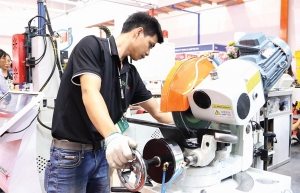Net-zero and AI ambitions face off
At the Vietnam Industrial Property Forum on July 30, a key topic of discussion was a global capital shift that presents Vietnam with an opportunity to become a key player in the production, supply, and testing chain of semiconductors, the backbone of AI.
 |
| Facilities like data centres require large amounts of electricity, Source: Shutterstock |
However, Kenddrick Chan, a senior policy analyst at the Tony Blair Institute, highlighted that AI was a high-energy-consuming sector, contributing to carbon emissions during production and operation.
“Deploying AI technologies requires substantial energy to run data centres, servers, and networking equipment. These centres operate 24/7, consuming large amounts of electricity and contributing to carbon emissions,” he said.
Chan further noted that manufacturing AI hardware, such as chips and processors, requires significant resources and energy, leading to greenhouse gas (GHG) emissions. He cautioned that the growing energy demand from AI could strain existing energy infrastructure and, without a shift to renewable sources, could impede efforts to meet zero-carbon targets.
“To achieve these goals, Vietnam must transition to renewable energy sources. However, the rapid development of AI could slow this process due to the increased reliance on non-renewable energy,” Chan said.
Nguyen Van Tai, director general of the Department of Nature Conservation and Biodiversity under the Ministry of Natural Resources and Environment, underscored the economic and social implications of achieving zero carbon in Vietnam.
“Vietnam has committed to reducing GHG emissions under the Paris Agreement on climate change. Reaching zero carbon is crucial for fulfilling this commitment and contributing to global efforts against climate change,” Tai said.
He added that achieving zero carbon would help Vietnam pull in international support and investment, boosting job creation through domestic projects.
AI’s influence is broad and growing in Vietnam. For instance, VinBrain, a Vingroup subsidiary, uses AI for remote management and diagnostics, assisting doctors with medical imaging diagnostics. Thousands of cases have been diagnosed through this platform.
Edmicro, an educational technology company, also leverages AI to personalise the learning experience for millions of students, while Rynan Technologies employs AI in smart agriculture management, enhancing productivity and reducing costs for farmers.
“Leading national corporations like Vingroup, FPT, and Viettel have made significant investments in AI projects, including VinAI Research, FPT.AI, and Viettel Cyberspace. International investment funds such as SoftBank Vision Fund and Sequoia Capital have also invested in Vietnamese AI companies,” said Le Thi Thanh Huong, an AI researcher at the Vietnam National University, Hanoi.
She also mentioned international collaborations like the Google AI Impact Challenge and the UN-AI4VN programme, showcasing Vietnam’s commitment to advancing AI.
A report by Google, Temasek, and Bain & Company projects Vietnam’s digital economy to reach $43 billion in 2025, with AI playing a significant role in this growth.
A leader from the Ministry of Planning and Investment emphasised the need for policies and regulations to ensure that AI development aligns with the zero-carbon goal. This includes promoting renewable energy use and developing energy-efficient AI technologies.
“Businesses and organisations must adopt sustainable practices in AI development, such as using energy-saving equipment, optimising algorithms, and investing in green infrastructure,” he said.
In 2020, Vietnam launched a national strategy on research, development, and application of AI towards 2030, aiming to make the country a regional hub for AI innovation. The strategy targets placing it among the top four ASEAN countries in AI and the top 50 globally. By 2023, Vietnam had attracted over $1 billion in related investments.
 | AI becoming increasingly prevalent for e-payments The rising risks of cashless payment fraud have led banks to accelerate implementation of AI-driven security measures and biometric authentication to enhance transaction safety and protect consumers. |
 | AI transforming Vietnam’s businesses for the better While AI is a key in the process of innovation and accelerating economic development, it needs support from many sides to strengthen the workforce and related startups. |
What the stars mean:
★ Poor ★ ★ Promising ★★★ Good ★★★★ Very good ★★★★★ Exceptional
Related Contents
Latest News
More News
- Vietnam sets ambitious dairy growth targets (February 24, 2026 | 18:00)
- Masan Consumer names new deputy CEO to drive foods and beverages growth (February 23, 2026 | 20:52)
- Myriad risks ahead, but ones Vietnam can confront (February 20, 2026 | 15:02)
- Vietnam making the leap into AI and semiconductors (February 20, 2026 | 09:37)
- Funding must be activated for semiconductor success (February 20, 2026 | 09:20)
- Resilience as new benchmark for smarter infrastructure (February 19, 2026 | 20:35)
- A golden time to shine within ASEAN (February 19, 2026 | 20:22)
- Vietnam’s pivotal year for advancing sustainability (February 19, 2026 | 08:44)
- Strengthening the core role of industry and trade (February 19, 2026 | 08:35)
- Future orientations for healthcare improvements (February 19, 2026 | 08:29)

 Tag:
Tag:


















 Mobile Version
Mobile Version